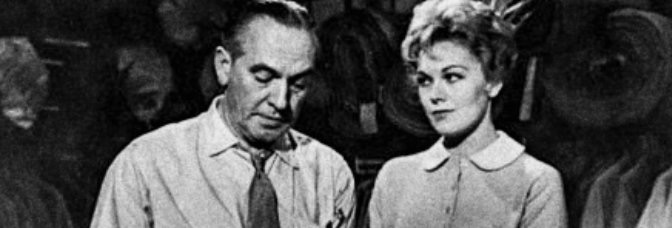Paddy Chayefsky adapted his own play for Middle of the Night and there are some clear alterations with original intent. Fifty-six year-old widower Fredric March is in garment manufacturing. His first scene has him hanging out with the other old guys in the factory, kvetching about how there’s nothing to do but visit their children. March’s character isn’t Jewish… but he was in the play. And apparently it was a big deal in the play. In the film, he’s probably Polish–though when he wows Kim Novak with Old World wisdom, it’s called a “European saying.” If it weren’t for Chayefsky’s dialogue for March and the boys–which comes up time and again–it wouldn’t be such a disconnect. Though occasionally March will do a light accent (with the exception of one scene where he goes all in) and it doesn’t come off. March is doing just fine. The film really doesn’t need the failed attempt at subtext leftover from the source play.
Novak is playing March’s twenty-four year-old receptionist. She’s recently divorced from musician Lee Philips (who, shockingly, originated the part on Broadway and isn’t in the film because the studio wanted some bland leading man type) and miserable. Confronted with Novak’s sadness, March shows some kindness. And becomes utterly infatuated with her. His business partner, Albert Dekker (in a devastating performance) is always out with younger women, but paying them for their time–well, putting it on customers’ expense accounts but March has no interest in that kind of thing. He feels sympathy and adoration for Novak. And finally works up the nerve to ask her on a date.
Now, until this moment in the film–the occasional awkward play adaptation aside–Chayefsky’s script hasn’t put any corners. Novak’s big opening scene where she breaks down to March is so thorough it looks like there’s added footage to her monologue (Carl Lerner’s editing occasionally has such problematic cuts it must have been something with the footage director Mann shot). Then the movie skips to their third date, when Novak has a hard talk with March. Now, she swears up and down she didn’t just keep going out with him because he was the boss and, based on the following ninety minutes of film, it’s more than believable. But then what was so successful about those first three dates? Sure, she’s lonely, but not actually alone (her best friend, Lee Grant, gets introduced in the last forty-five minutes but she should’ve been around at the time–not to mention kid sister Jan Norris who goes unmentioned until she appears at the same time as Grant). It seems like Chayefsky’s cutting some corners. And it sticks out. And it sticks out again when Grant and Norris show up, because why hasn’t Novak’s life been important until so much later… The movie wants a pass on it.
And I haven’t even gotten to the part where, after promising Novak he’ll leave her alone, March forces himself on her. At the factory, at night (presumably the Middle of the Night), and basically breaks her down into agreeing to their romance. But he’s good to her, even if it’s a little paternal. Or so she keeps saying. Their scenes together tend to be their problem scenes. March is incredibly likable so it’s all reasonable, he’s just always in a mood when he’s with Novak, which is all of her scenes in the movie until after the halfway point. Novak making their relationship seem real is a heck of a lot more impressive than what March has to put into it. He’s just got to puff out his chest because she’s this gorgeous twenty-four year-old who wants him. Or does a reasonable facsimile of wanting him.
Middle of the Night’s biggest defect is the utter avoidance of honesty between Novak and March. There’s a bit of a showdown scene in the third act, before a deus ex, but it’s too little, too late. They’re more than willing to be honest away from each other–the scene where Novak lays it out to best friend Grant is fantastic, ditto the one where March finally talks to Dekker about being a dirty old man (just a nice one)–and it’d have done wonders for the character development for them to be honest together. Especially if it had been in the first half of the picture or so, because Middle of the Night is kind of long at two hours.
It’s always well-acted, it’s beautifully directed and photographed (Joseph C. Brun’s black and white is breathtaking), and Chayefsky’s dialogue is always on point–when there’s not too much dialect flourish–so it’s not a bad two hours at all. The third act has some great pay-off, it just comes a little too late. All that time Chayefsky’s script skips over is apparently not just for the onscreen action, it’s like the character development paused for it too. Other than March’s puffed chest. Novak’s on pause for most of the movie.
With the exception of Philips, all the acting is good. March is great. Novak’s like one moment of onscreen realization away from being twice as good (the movie’s way too condescending towards Novak’s character). Edith Meiser’s good as March’s sister, who lives with him and doesn’t like the idea of Novak. Shocker. Joan Copeland plays one of two daughters–the other one doesn’t figure in at all. She’s really good at the beginning, when her writing is better; in the second half of the film, both she and Mesier are basically competing for bigger harpy. Martin Balsam’s fun as Copeland’s husband. It’s not a great part, but he does well with it.
On the other side of the proverbial aisle, Grant’s the best. She’s got one hell of a monologue about the misery of married life, which echoes Dekker’s–just separated by gender… and thirty plus years–she’s also the only one who’s able to make believe she’s got any concern for Novak. Sister Norris and mom Glenda Farrell at one point seem like they’re going to help Philips assault Novak, they’re so passively cruel and actively dismissive of her agency. The movie wants to say something about Norris being a young tart but doesn’t. And Farrell wins the harpy contest.
Every time Middle of the Night gets problematic, you just have to wait it out and eventually Mann will do something great or Brun will have an amazing shot and March and Novak will have gotten through whatever contrived problem they have and it sails on until the next problem. Then it just grinds until it passes again. And so on. March and Novak mesmerize, against the glorious black and white New York–fantastic score from George Bassman too. There are a lot of successful parts (the lead performances, the technical aspects–save those bad Lerner cuts, which don’t seem to be his fault), it’s just not a success overall. Someone needed to make some hard choices and neither Chayefsky nor Mann did.
 ★★½
★★½
CREDITS
Directed by Delbert Mann; screenplay by Paddy Chayefsky, based on his play; director of photography, Joseph C. Brun; edited by Carl Lerner; music by George Bassman; produced by George Justin; released by Columbia Pictures.
Starring Fredric March (Jerry Kingsley), Kim Novak (Betty Preisser), Edith Meiser (Evelyn Kingsley), Joan Copeland (Lillian Englander), Martin Balsam (Jack Englander), Glenda Farrell (Mrs. Mueller), Jan Norris (Alice Mueller), Lee Grant (Marilyn), Lee Philips (George Preisser), and Albert Dekker (Walter Lockman).
THIS POST IS PART OF THE LOVELY LEE GRANT BLOGATHON HOSTED BY GILL OF REALWEEGIEMIDGET REVIEWS and CHRIS OF ANGELMAN’S PLACE.
RELATED


Leave a reply to Christopher Cooper Cancel reply